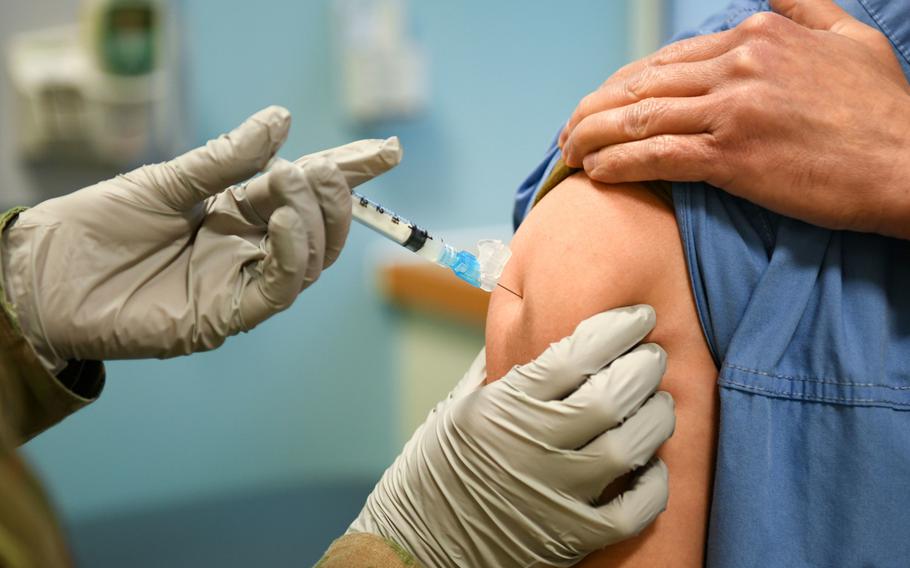
An Airman assigned to the 48th Fighter Wing Medical Group receives the COVID-19 vaccine at RAF Lakenheath, England, Dec.29, 2020. The U.S. military’s campaign to vaccinate personnel in Europe against the coronavirus gathered steam this week as health care workers on the front lines of fighting COVID-19 were inoculated at bases in Germany and the United Kingdom. (Madeline Herzog/U.S.Air Force)
Stars and Stripes is making stories on the coronavirus pandemic available free of charge. See other free reports here. Sign up for our daily coronavirus newsletter here. Please support our journalism with a subscription.
Members of military families are less likely than the general population to receive the coronavirus vaccine when they are eligible, according to a survey conducted by the military nonprofit Blue Star Families.
In December, 33 percent of the 674 survey respondents said they would receive a coronavirus vaccine approved by the Food and Drug Administration should it become available at no cost. Meanwhile, a Gallup survey of the general U.S. population found 58 percent of respondents were willing to receive the vaccine.
“What we’ve seen is that military families are expressing a lot of concern about the vaccine,” said Kathy Roth-Douquet, CEO of Blue Star Families, a nonprofit that provides resources to military families while also conducting research to better understand the challenges they face. “We’re seeing that people don’t have a sense of trust about the vaccine. They have strong concerns about the development process and timeline.”
Among the 53 percent of military families who responded to the survey that they would not receive the vaccine, nearly three-quarters cited a distrust of the development process or timeline.
“Trust is really at the root of this issue,” said Roth-Douquet, whose husband served 30 years in the Marine Corps. “Trust can be hard for military families because of the rate that we move around from place to place. You don’t really have those trusted networks in your community that you’ve got a deep history with or that you feel like you can really rely on.”
About 14 percent of families said they remain undecided, with most saying they would like more information of side effects to make that decision. For that reason, Blue Star Families coordinated a virtual town hall Thursday to allow families to ask questions directly to health experts and military leadership.
In the lead up to the town hall, more than 1,000 questions were submitted. Dr. Anthony Fauci, director of the National Institute of Allergy and Infectious Diseases, jumped straight into addressing what the survey found to be the most common concern: the vaccine’s timeline and approval process.
“The speed is completely related to the extraordinary advances in scientific platform technology for vaccines. There were no corners cut. We did not sacrifice safety, nor did we sacrifice scientific integrity,” Fauci said. “That’s the reason why many of you hear me every day in media saying, ‘When your turn comes up, please get the vaccine. Both for your own safety, for that of your family and that for the American community in general.”
Severe side effects have been rare, just about one to six people per 1 million, Fauci said. Even if someone has a history of allergic reactions, he said he still recommends they get the vaccine, so long as they do so in a place that can manage an adverse reaction.
“If you look at the safety of vaccines in general, the risk-to-benefit ratio of safety is about as good as you can get with any medical intervention that you give to anyone. The safety record for this, even though it’s just been one year, is actually quite good,” Fauci said.
As of Thursday, the Defense Department has administered at least one of the two doses required of the vaccine to more than 424,000 people, according to the national Centers for Disease Control and Prevention. The Defense Department has its own tiered approach for the order in which it will vaccinate service members, families and beneficiaries. Some locations have begun offering the vaccine to beneficiaries 75 and older, said Lt. Gen. Ronald Place, director of the Defense Health Agency. Soon, he expects some locations will expand to people 65 and older.
Place said military beneficiaries do not have to wait for eligibility within the military health system for access. They can use state and local resources in their community.
For families living overseas, the Pentagon counted them in the department’s vaccine requirements, he said. However, the department is only shipping vaccines made by Moderna to overseas locations and it is not approved for anyone younger than 18.
The Blue Star Families survey found even for those military families who would receive the vaccine, it dropped to 18 percent of respondents who were willing to have their children vaccinated.
The nonprofit is planning to host another event to discuss the vaccine, Roth-Douquet said.
“We really want to be able to take our children to visit their grandparents without putting the grandparents at risk. There’s lots of scenarios in which this [vaccine] is good for our community and we need to talk those through,” she said.
The video of the town hall and the full report on the survey are available at the nonprofit’s website.
thayer.rose@stripes.com Twitter: @Rose_Lori